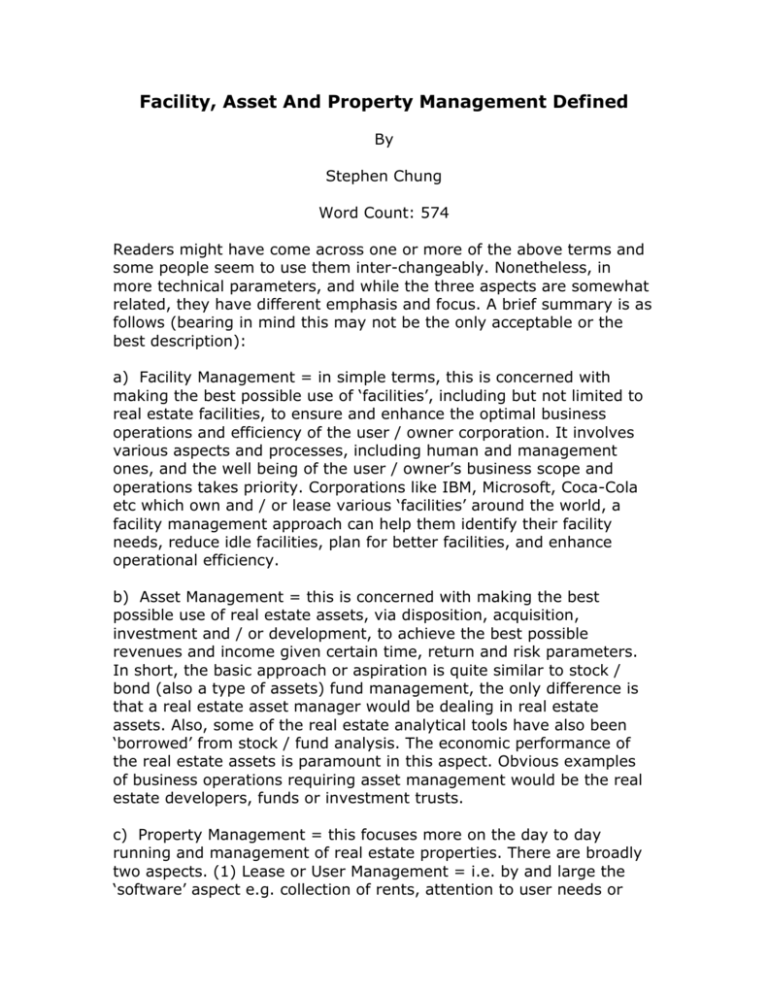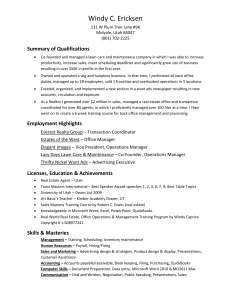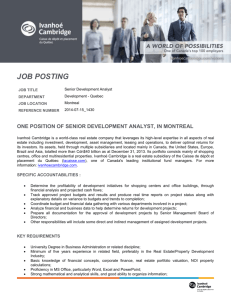
Facility, Asset And Property Management Defined
By
Stephen Chung
Word Count: 574
Readers might have come across one or more of the above terms and
some people seem to use them inter-changeably. Nonetheless, in
more technical parameters, and while the three aspects are somewhat
related, they have different emphasis and focus. A brief summary is as
follows (bearing in mind this may not be the only acceptable or the
best description):
a) Facility Management = in simple terms, this is concerned with
making the best possible use of ‘facilities’, including but not limited to
real estate facilities, to ensure and enhance the optimal business
operations and efficiency of the user / owner corporation. It involves
various aspects and processes, including human and management
ones, and the well being of the user / owner’s business scope and
operations takes priority. Corporations like IBM, Microsoft, Coca-Cola
etc which own and / or lease various ‘facilities’ around the world, a
facility management approach can help them identify their facility
needs, reduce idle facilities, plan for better facilities, and enhance
operational efficiency.
b) Asset Management = this is concerned with making the best
possible use of real estate assets, via disposition, acquisition,
investment and / or development, to achieve the best possible
revenues and income given certain time, return and risk parameters.
In short, the basic approach or aspiration is quite similar to stock /
bond (also a type of assets) fund management, the only difference is
that a real estate asset manager would be dealing in real estate
assets. Also, some of the real estate analytical tools have also been
‘borrowed’ from stock / fund analysis. The economic performance of
the real estate assets is paramount in this aspect. Obvious examples
of business operations requiring asset management would be the real
estate developers, funds or investment trusts.
c) Property Management = this focuses more on the day to day
running and management of real estate properties. There are broadly
two aspects. (1) Lease or User Management = i.e. by and large the
‘software’ aspect e.g. collection of rents, attention to user needs or
requests, tenancy coordination and recording etc. (2) Building
Maintenance = i.e. the ‘hardware’ aspect e.g. fixing leaking pipes,
performing routine building tests, renovating dilapidated portions etc.
The latter may also be further divided into several categories = (a)
Preventive Maintenance, such as routine inspections of elevators, (b)
Regular Maintenance, such as replacement of fire extinguishers in
batches before expiration, and (c) Ad-Hoc Maintenance, such as fixing
a leaking drain pipe.
If there is any relationship between the above three aspects, it would
be that the first two would require a good property management team
to maintain, monitor and manage their facilities and assets so that the
desired results would be achieved (or have a better chance of being
achieved).
Stephen Chung, Zeppelin Real Estate Analysis Limited, has over 15
years of experience in real estate development, investment,
management, marketing and consulting spanning across Hong Kong /
China, Asia and North America. He is a Chartered Surveyor by
profession and holds a Masters degree in real estate from MIT.
Stephen is also much sought after by universities and business
associations as a real estate guest speaker. He is currently an
adjunct lecturer with the City University of Hong Kong. Copyright©
2001, Stephen Chung. All rights reserved. For additional information
about Stephen’s presentations, please contact the Frog Pond Group at
800-704-FROG (3764) or email Susie@frogpondgroup.com;
http://www.frogpondgroup.com.









